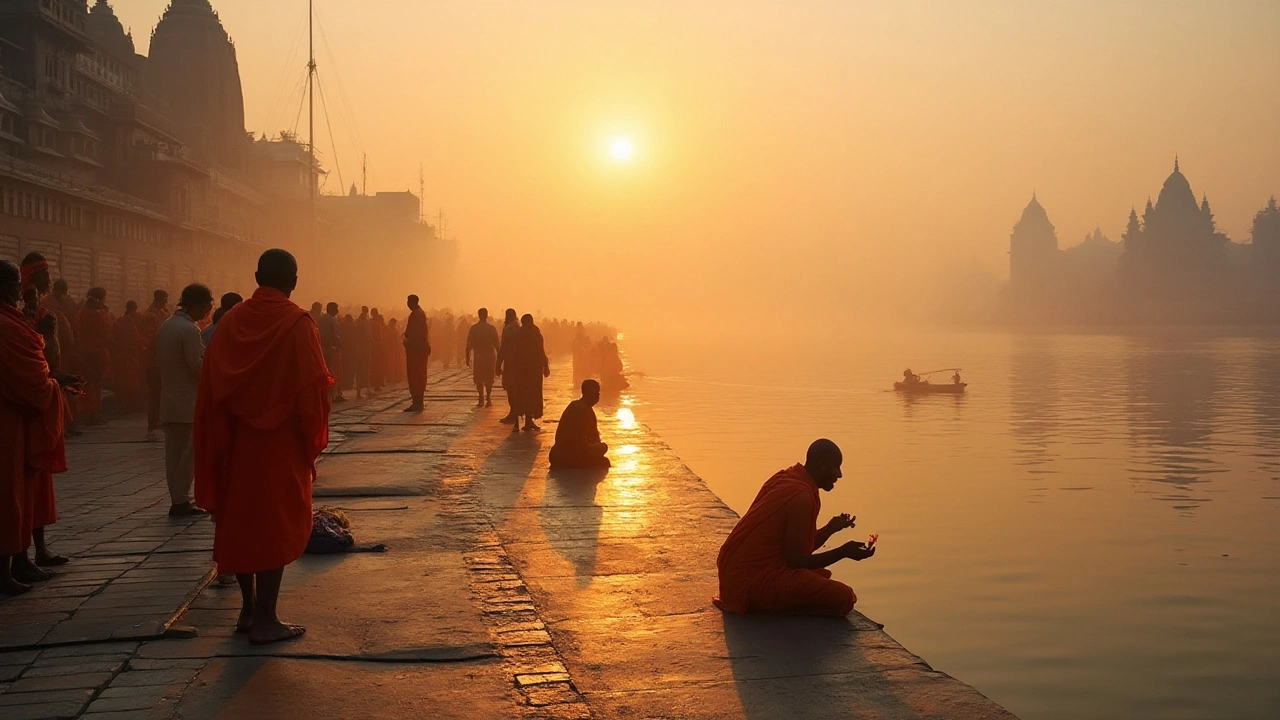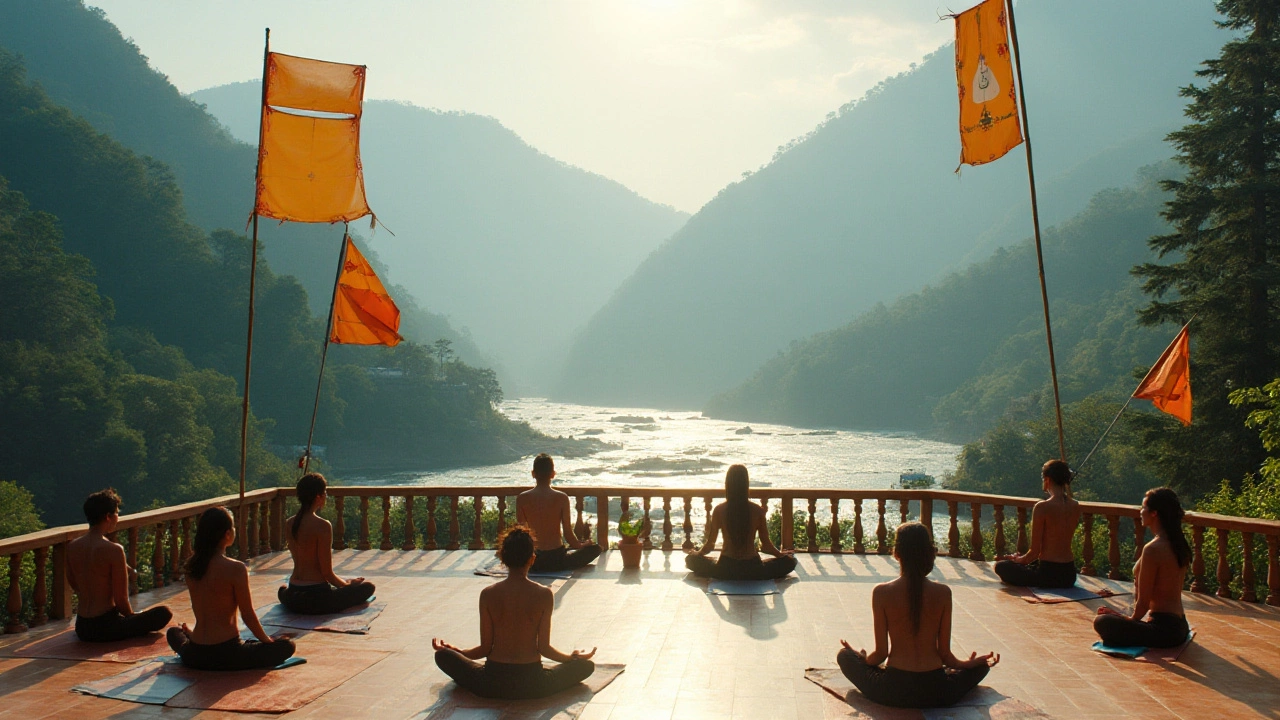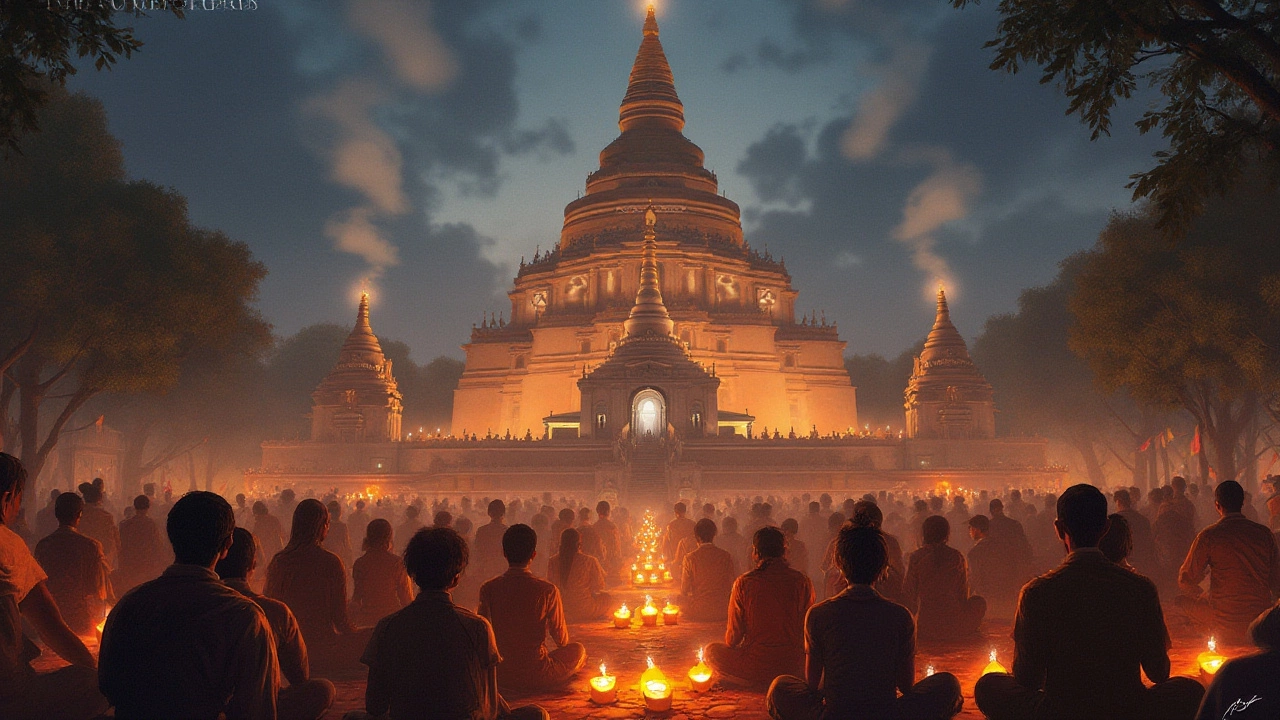Discover India's Most Spiritual Destinations and Their Timeless Mystique
 Dec, 5 2024
Dec, 5 2024
India's spiritual tapestry is as diverse as its landscapes, offering profound experiences to seekers worldwide. Visitors journeying through the subcontinent often feel an irresistible pull towards places that promise transformative spiritual encounters.
From the ancient ghats of Varanasi to the meditative silence of Bodh Gaya, each location holds a unique charm and significance. In Rishikesh, the Ganges sings a timeless song of peace, while the temples of Tamil Nadu speak of devotion and mystery. Kerala, with its serene backwaters, invites travelers to embark on a healing journey for the soul.
Join us as we explore these spiritual havens, uncovering the stories and traditions that continue to inspire and uplift those who visit.
- The Spiritual Significance of Varanasi
- Rishikesh: The Yoga Capital of the World
- Bodh Gaya: The Cradle of Buddhism
- The Ancient Temples of Tamil Nadu
- Harmonizing the Body and Soul in Kerala
The Spiritual Significance of Varanasi
Among all the sacred realms of India, Varanasi holds a special place, weaving together centuries of history and deep-rooted spirituality. As one of the oldest continuously inhabited cities in the world, Varanasi, also known as Kashi, is a spiritual epicenter for Hindus, fervently visited by pilgrims seeking solace and divine blessings. Its mystical allure begins as the first light of dawn bathes the Ganges River, the city’s lifeline, in golden hues. Pilgrims flock to its hundred ghats, immersing themselves in holy rituals believed to cleanse sins and lead to moksha, or liberation from the cycle of birth and death.
The landscape of Varanasi is dotted with countless temples, each with unique legends and deities. The Kashi Vishwanath Temple, dedicated to Lord Shiva, is the city's most iconic. It's said that a visit here can bestow devotees with spiritual reawakening and liberation. The devout believe that Lord Shiva himself whispered the sacred taraka mantra into the ears of the dying at Varanasi, guiding them to enlightenment. Such stories add to the palpable divine energy that attracts millions every year.
"Benaras is older than history, older than tradition, older even than legend, and looks twice as old as all of them put together." — Mark Twain
The spiritual practices here are not confined to temples. Varanasi is also a thriving cultural hub where ancient knowledge, music, and art harmoniously blend with religious fervor. The sound of sitars echoes through narrow alleys, while melas (fairs) like the Ganga Mahotsav celebrate the music and crafts of the region. Each performance is a tribute to the city’s enduring spiritual and cultural ethos, connecting people beyond religious boundaries.
As evening descends, the Ganga Aarti, a daily ritual on the ghats, takes place. This grand spectacle of lights, sound, and devotion offers a deeply moving experience. As priests perform choreographed rituals with flaming torches and clanging cymbals, chants rise into the night, creating a mesmerizing scene that evokes a sense of peace and unity. The aarti honors the sacred river believed to be the goddess Ganga in physical form, washing away earthly pains and grievances.
For those seeking deep introspection and a broader understanding of life, Varanasi offers a rare fusion of teaching and reflection. The Banaras Hindu University, an esteemed seat of learning, provides insights into classical Indian philosophy and spirituality. The city’s ashrams and workshops, scattered in peaceful corners, invite seekers to meditate and discover newfound spiritual paths. These places, void of worldly distractions, enable a deeper connection with oneself and with the spiritual energies surrounding them.
Varanasi’s charm also lies in its dichotomies—a bustling city that remains a peaceful reservoir of spiritual wisdom. Its spiritual significance transcends the tangible, creating an invisible bond between those who tread its sacred grounds and the divine. To visit Varanasi, to feel its pulse and rhythm, is to experience a part of India that remains rooted in spirituality, calling out not just to pilgrims, but to anyone in pursuit of a soulful journey.
Rishikesh: The Yoga Capital of the World
Nestled in the foothills of the mighty Himalayas, on the banks of the sacred river Ganges, lies the serene town of Rishikesh, a place that has become synonymous with yoga and spirituality. This town is not just a geographical landmark but a spiritual experience, drawing thousands of visitors each year, seeking inner peace and higher consciousness. The journey of yoga in Rishikesh can be traced back to centuries as sages and yogis found solace in its tranquil environs, practicing and perfecting the art of balancing the mind and body. This quaint town gained international fame when the Beatles traveled here in the 1960s, staying at the ashram of Maharishi Mahesh Yogi and discovering transcendental meditation. Their stay marked the beginnings of an east-west exchange in spiritual ideas, marking Rishikesh as a pivotal point in global yoga culture.
Walking through Rishikesh, one can feel a palpable connection to the ancient spiritual traditions that pervade every corner. Ashrams and yoga schools line the streets, each offering teachings and practices that aim to harmonize the body, mind, and spirit. Whether you are a seasoned practitioner or a curious beginner, Rishikesh provides an array of opportunities to immerse yourself in mystical India. Classes range from traditional Hatha yoga and Kundalini to more modern adaptations such as Vinyasa. A unique aspect of this town is that beyond yoga, Rishikesh serves as a hub for various forms of spiritual disciplines, including karma yoga, bhakti yoga, and meditation.
Rishikesh’s charm lies not only in its spiritual offerings but also in its natural beauty. The Ganges River, emerging directly from the snowy peaks, is believed to have divine cleansing powers. Morning and evening ascend the ghats to witness the mesmerising Ganga Aarti, where hundreds of lamps float delicately on the river, a sight both humbling and uplifting. The serenity of the surrounding mountains complements the spiritual atmosphere, providing a perfect backdrop for introspection and self-discovery. It's as if nature itself participates in the transformative journey of every seeker visiting the town.
The local culture of Rishikesh is as welcoming as its spiritual ethos. Engaging with local communities often leads to exchanges rich in cultural and philosophical insights. Many yoga schools pride themselves not only on teaching postures but integrating a lifestyle of simplicity, vegetarianism, and sustainability. These holistic approaches echo the teachings of traditional Indian philosophy, advocating for a life in harmony with the natural world and one's inner self. Rishikesh's worldwide reputation as the spiritual capital of yoga is well-earned, and its unique blend of natural beauty and spiritual depth makes it a must-visit for those in search of peace and enlightenment.
Swami Sivananda, a renowned Indian spiritual leader, beautifully encapsulates the essence of Rishikesh's impact on yoga enthusiasts, saying,
"A mountain is nothing but a big temple, and temple nothing but a small mountain". It reminds us that enlightenment can be found in both grand vistas and quiet corners, a truth that Rishikesh embodies with grace and beauty.

Bodh Gaya: The Cradle of Buddhism
Bodh Gaya, nestled in the heart of Bihar, is one of the most revered sites in the Buddhist world, teeming with spiritual significance and ancient history. Known primarily as the place where Prince Siddhartha attained enlightenment under the Bodhi tree, this small town has been a beacon for pilgrims and travelers around the globe. The Mahabodhi Temple complex, a UNESCO World Heritage Site, stands as a testament to this pivotal moment in history, drawing visitors with its aura of peaceful sanctity. Constructed initially in the 3rd century BC by Emperor Ashoka, the temple has undergone numerous repairs over the centuries, yet it continues to encapsulate the simple yet profound teachings of Buddhism.
When wandering through Bodh Gaya, one can feel the palpable connection between the past and present. The age-old Bodhi tree, believed to be an offshoot of the original fig tree, beckons with the promise of contemplation and self-discovery. Devotees often gather here to meditate and chant, hoping to absorb the enlightening vibrations that linger in the air. The town is more than just a historical site; it is alive with the energy of thousands who come seeking answers and solace. A mesmerizing blend of cultures and traditions congregates here, with monasteries from diverse countries like Tibet, Japan, and Bhutan, each offering its perspective on Buddhist practices.
According to legend and lore, Siddhartha Gautama's path to enlightenment was marred with trials and tribulations. He spent days in deep meditation, wrestling with worldly desires and fears. The decisive moment came when he finally transcended suffering, gaining profound insights into the nature of existence — a discovery that later became the foundation of Buddhism. As the words of the Dalai Lama remind us, "The purpose of our lives is to be happy, and it is crucial to cultivate inner transformation."
The very air of Bodh Gaya seems to echo this sentiment, guiding visitors towards personal growth and inner peace.
Exploring Bodh Gaya doesn't stop at the Mahabodhi Temple. The Great Buddha Statue, towering at 80 feet, reflects the serene and compassionate spirit of the Enlightened One. Its construction was a collaborative effort, involving artisans and Buddhists from several nations, signifying global unity. The statue's presence underscores the universal appeal and wisdom of Buddhism, which has transcended geographical and cultural barriers. Nearby, small shops lined with vibrant prayer flags and incense sticks offer visitors a tangible essence of the town’s spiritual ambiance.
Many travelers to Bodh Gaya find themselves drawn into the rhythm of simplicity and reflection the area naturally promotes. Retreat centers and meditation courses avail themselves to all who seek deeper mindfulness and tranquility. Here, spiritual journeys often complement physical ones, encouraging introspection and self-knowledge while fostering a deeper connection with one's spiritual path. The hum of daily life in Bodh Gaya, interspersed with the sound of temple bells and chanting monks, acts as a serene soundtrack to personal exploration and enlightenment.
The Ancient Temples of Tamil Nadu
In the southern reaches of India lies Tamil Nadu, a state that prides itself on a rich tapestry of spiritual and architectural wonders. The ancient temples of Tamil Nadu are not just places of worship; they are living museums of the art, culture, and history that span over millennia. These sacred structures, often clad in a mystic aura, serve as portals to a time when spirituality and artistry were seamlessly woven into daily lives. The intricate carvings, towering gopurams (gateway towers), and the stories etched into the stones reveal the tales of gods, humans, and the universe, creating a profound connection between the earthly and the divine.
One cannot talk about these temples without mentioning the iconic Brihadeeswarar Temple in Thanjavur. Built during the Chola dynasty in the 11th century, this UNESCO World Heritage site stands as a testament to Tamil Nadu's mystical places. The temple, dedicated to Lord Shiva, features a massive, intricately carved Vimana (tower) that reaches up to 66 meters. Legend has it that no shadow falls on the ground at noon, a fact that continues to amaze visitors and architects alike. Such architectural brilliance showcases the advanced knowledge and skills of ancient Indian craftsmen. In addition to Brihadeeswarar, the Meenakshi Temple in Madurai is another marvel that bathes in spiritual significance. The temple's striking gopurams are adorned with thousands of colorful carvings depicting gods, demons, and celestial figures. Pilgrims are drawn to its sacred precincts to experience the spiritual journey it offers, one that blends myth with history and art with reverence.
The state is also home to the Shore Temple at Mamallapuram, subtly standing by the serene Bay of Bengal. Built by the Pallavas in the 8th century, this UNESCO-listed site provides insight into early Dravidian architectural styles. The temple complex, with its monolithic structures, was once a bustling port city of great importance. As one walks through this site, the whispers of ancient traders, scholars, and voyagers can almost be heard, adding to its sacred cities allure. A visit to Tamil Nadu's temples often becomes a transformative experience. Many travelers recount a sense of peace and enlightenment that washes over them while they explore these sacred spaces. As Swami Vivekananda once said,
"A temple is not just a place; it's a profound experience of tranquility and connection to the cosmic soul."These words hold true as one dives into the soul of Tamil Nadu through its divine architecture.
For those venturing on a spiritual journey, the temples of Tamil Nadu provide an unparalleled opportunity to delve deep into India's spiritual heritage. Whether you're a pilgrim or a history buff, the stories, and secrets they guard offer a gateway to understanding the deeper meanings of life, existence, and interconnectedness. Plan your path well to include the small yet equally significant temples that dot the lush countryside, and immerse yourself in the timeless magic they encapsulate.

Harmonizing the Body and Soul in Kerala
Nestled in the southwestern tip of India, Kerala is a land where nature and spirituality converge to create a harmonious ecosystem. Known as 'God's Own Country', it is renowned for its stunning landscapes—lush greenery, serene backwaters, and pristine beaches—which together foster an environment perfect for spiritual growth and healing. The state's spiritual essence is immensely influenced by its profound connection to Ayurveda, the ancient system of natural and holistic healing, which promises not only to heal the body but also to rejuvenate the soul. Kerala's traditional healing practices are deeply intertwined with daily life here, making the entire region a living testament to peace and wellness.
For centuries, people have traveled to Kerala seeking purification and relaxation, offering a unique opportunity to harmonize body and soul. Visitors often partake in various panchakarma treatments at world-renowned Ayurvedic retreat centers. An Ayurvedic spa experience typically includes personalized therapies designed to rid the body of toxins and improve physical and mental well-being. These therapies are not merely treatments; they represent a lifestyle aligning with natural rhythms and wellness principles. Renowned for its therapeutic benefits, Ayurveda in Kerala captivates all who experience its ancient wisdom. Traditional diets emphasize fresh, local ingredients that balance the body's doshas, or biological energies, guiding both physical health and spiritual clarity.
While the curative powers of Ayurveda attract visitors, the healing serenity of Kerala's natural environment is an equally significant draw. The tranquil backwaters offer a perfect setting for meditation and reflection, while the pristine beaches provide an ideal backdrop for yoga practice. In fact, Kerala's commitment to bodily and spiritual wellness extends beyond its wellness retreats, integrating seamlessly into everyday life. It’s a place where morning yoga sessions on the beaches, followed by an indulgent Ayurvedic massage, can become part of your routine, allowing you to embrace a state of complete relaxation and mindfulness. Each experience here is a step towards achieving spiritual balance.
In Kerala, the practice of Yoga is not just a physical activity; it's a spiritual journey that offers a deeper connection with one's self and the universe. The yoga retreats scattered throughout the state offer travelers an authentic experience, combining yogic practices with meditation sessions aimed at achieving inner peace. The lush environment enhances these practices, helping to ground and center one's spiritual energies. Practitioners in Kerala believe that true wellness is achieved when the mind, body, and spirit coexist in perfect harmony—a belief that draws many to experience the serenity and mysticism of this sacred land.
"Kerala is a place where nature's magic and humanity's spirituality dance together in rhythm," says wellness guru Dr. Rajiv Narayan, highlighting the state's unique blend of spiritual and natural elements.
Whether you seek to immerse yourself in Ayurvedic treatments or practice yoga and meditation by the backwaters, Kerala offers a sanctuary for anyone yearning for holistic healing. As travelers continue to flock to this beloved destination, it's clear that its spiritual allure shows no signs of waning. Taking a spiritual journey across Kerala offers a profound transformation, and its enduring magic ensures that every visit resonates with a sense of deep peace and enlightenment. Such an immersive experience can also inspire travelers to integrate the teachings and practices gained during their stay into their daily lives, creating a ripple effect of mindfulness and balance well beyond their time in this captivating land.